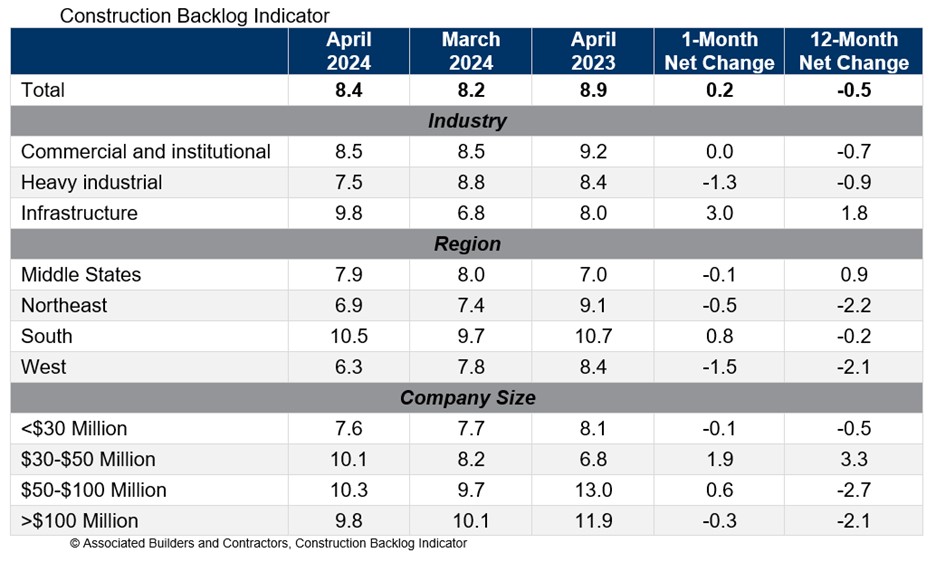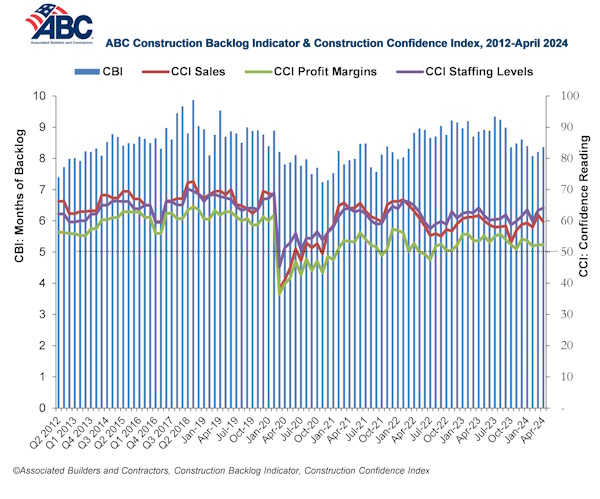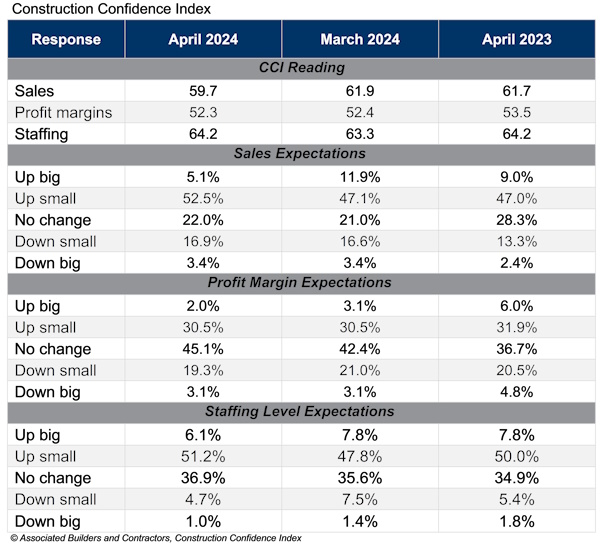Associated Builders and Contractors reported that its Construction Backlog Indicator increased to 8.4 months in April, according to an ABC member survey conducted April 22 to May 6. The reading is down 0.5 months from April 2023, but expanded 0.2 months from the prior month.
Backlog declined on a monthly basis for the largest and smallest contractors by revenue and grew for those with $30-$50 million and $50-$100 million in annual revenues. On an annual basis, only contractors with $30-$50 million in annual revenues have experienced an increase in backlog.
ABC’s Construction Confidence Index readings for sales and profit margins fell slightly in April, while the reading for staffing levels improved. All three readings remain above the threshold of 50, indicating expectations for growth over the next six months.

“The Federal Reserve began ratcheting up interest rates more than two years ago but one would not know it based on construction confidence and backlog,” said ABC Chief Economist Anirban Basu. “ABC measurements reflect ongoing momentum in the nation’s nonresidential construction sector. While there are occasional hints of softness in certain segments and over certain periods, the average contractor continues to report solid backlog and a belief that sales, employment and profit margins will expand over the next six months.
“Time will tell whether this optimism is justified,” said Basu. “Coming into the year, many expected that interest rates would fall markedly in 2024. Given stubbornly elevated inflation, that will not occur. Project financing costs are poised to remain higher for longer. Project cancellations and postponements have been on the rise. Moreover, a new set of supply chain issues has emerged, driving up materials costs and prospectively weakening industry margins. Workers also are becoming more expensive, in part because the construction wage premium has shrunk over the past several years due to rapidly rising compensation levels in competing segments like logistics and retail. The implication is that construction compensation levels will need to rise for the industry to be able to staff up more fully."


Related Stories
| Aug 11, 2010
Architecture Billings Index drops to lowest level since June
Another stall in the recovery for the construction industry as the Architecture Billings Index (ABI) dropped to its lowest level since June. The American Institute of Architects (AIA) reported the August ABI rating was 41.7, down slightly from 43.1 in July. This score indicates a decline in demand for design services (any score above 50 indicates an increase in billings).
| Aug 11, 2010
Construction employment declined in 333 of 352 metro areas in June
Construction employment declined in all but 19 communities nationwide this June as compared to June-2008, according to a new analysis of metropolitan-area employment data released today by the Associated General Contractors of America. The analysis shows that few places in America have been spared the widespread downturn in construction employment over the past year.
| Aug 11, 2010
Jacobs, Hensel Phelps among the nation's 50 largest design-build contractors
A ranking of the Top 50 Design-Build Contractors based on Building Design+Construction's 2009 Giants 300 survey. For more Giants 300 rankings, visit http://www.BDCnetwork.com/Giants
| Aug 11, 2010
Balfour Beatty agrees to acquire Parsons Brinckerhoff for $626 million
Balfour Beatty, the international engineering, construction, investment and services group, has agreed to acquire Parsons Brinckerhoff for $626 million. Balfour Beatty executives believe the merger will be a major step forward in accomplishing a number of Balfour Beatty’s objectives, including establishing a global professional services business of scale, creating a leading position in U.S. civil infrastructure, particularly in the transportation sector, and enhancing its global reach.
| Aug 11, 2010
Construction unemployment rises to 17.1% as another 64,000 construction workers are laid off in September
The national unemployment rate for the construction industry rose to 17.1 percent as another 64,000 construction workers lost their jobs in September, according to an analysis of new employment data released today. With 80 percent of layoffs occurring in nonresidential construction, Ken Simonson, chief economist for the Associated General Contractors of America, said the decline in nonresidential construction has eclipsed housing’s problems.
| Aug 11, 2010
CHPS debuts high-performance building products database
The Collaborative for High Performance Schools (CHPS) made a new tool available to product manufacturers to help customers identify building products that contribute to sustainable, healthy, built environments. The tool is an online, searchable database where manufacturers can list products that have met certain environmental or health standards ranging from recycled content to materials that contribute to improved indoor air quality.
| Aug 11, 2010
ICC launches green construction code initiative for commercial buildings
The International Code Council has launched its International Green Construction Code (IGCC) initiative, which will aim to reduce energy usage and the carbon footprint of commercial buildings.Entitled “IGCC: Safe and Sustainable By the Book,” the initiative is committed to develop a model code focused on new and existing commercial buildings. It will focus on building design and performance.







